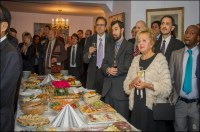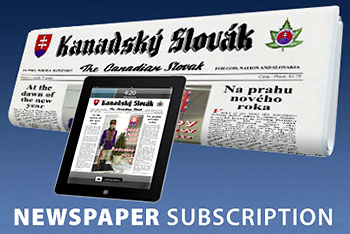 On the evening of November 20th, the Slovak Embassy opened its doors to eminent representatives from Ottawa's diplomatic and political circles who gathered at the reception to commemorate the ground-breaking events that 25 years ago forever changed the socio-economic landscape of Czechoslovakia and Europe as a whole. The anniversary of the Velvet Revolution is remembered by Czechs and Slovaks around the world and Ottawa's Slovak community was no exception.
On the evening of November 20th, the Slovak Embassy opened its doors to eminent representatives from Ottawa's diplomatic and political circles who gathered at the reception to commemorate the ground-breaking events that 25 years ago forever changed the socio-economic landscape of Czechoslovakia and Europe as a whole. The anniversary of the Velvet Revolution is remembered by Czechs and Slovaks around the world and Ottawa's Slovak community was no exception.
The Velvet Revolution was a "key event in modern history of our country," stated His Excellency, Slovak Ambassador Andrej Droba in his opening remarks. The persistent demand for change and basic freedoms ended over 20 years of political oppression during which many talented and praiseworthy individuals had left Czechoslovakia in search of a better, safer life abroad. Thanks to the courageous and non-violent demonstrations of Czechoslovak citizens symbolically holding keys in their hands to show it was time to close the rusty old door and open a new one to a brighter future, "we are free today; free to pursue our goals," added the Ambassador.
Today, Slovakia is a proud democratic country. Its story is presented as a story of success, visa-free travel, accession to the European Union and North Atlantic Treaty Organization, and entrance into the Shengen and Euro zone.
This special evening was also a great opportunity to celebrate the contributions of Slovak immigrants to Canada, namely the recent recipient of the Slovak Academy of Science Award and the Award for Extraordinary Achievements, Dr. Pavel Chebeň, Leading Senior Researcher at the Canadian National Research Council. Dr. Chebeň was humbled by this honour and the warm applause bestowed upon him by the reception's attendees. "I have deep respect for my home country where I was raised and educated," said Dr. Chebeň.
He also reminisced about how the years before 1989 had been marked by the promotion of technological advancements by communist authorities who were promising the possibility of a vacation on the moon when it was unthinkable to visit Austria a mere fence away. Now, the fence is gone and in the words of Ambassador Droba, the only sign that a Slovak citizen living in Bratislava has crossed the border to neighbouring Austria is the change in the speed limit.
Text: Maria Habanikova, Photos: Tibor Dej




